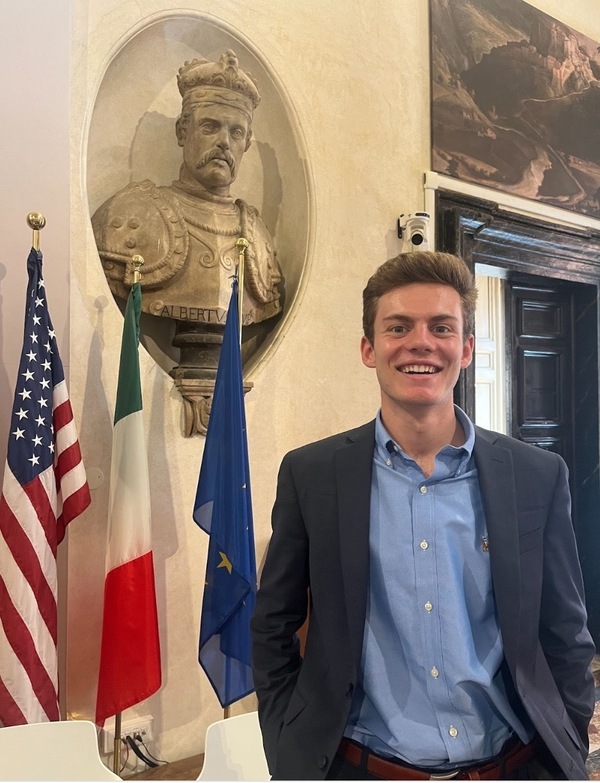During the summer after my first year at Notre Dame, I participated in Notre Dame’s Irish Internship program, an eight-week internship experience in Dublin, Ireland fully funded by the University. As many friends of mine can attest, I can firmly say that my eight weeks in Ireland were the most transformative eight weeks of my life. In Ireland, I realized how big the world is, how much the little problems I had didn’t matter, how little you should care about the opinions of others, how much you should care about the opinions of your family and friends matter, and so much more.

I recommend living abroad, whether that be for study or work, to every Notre Dame student. Nevertheless, these experiences are so much better when you have the financial backing of the University. This summer, I have spent the last two months working for a government lobbying firm in Rome. This experience was fully funded by my merit scholarship at Notre Dame and my minor’s Lyman Grant for Public Service and has allowed me to explore all throughout Italy while engaging with a fascinating field of work.
Often when I share these experiences on ND Admissions social media accounts, I get lots of questions: How did you find these experiences abroad? How did you pay for them?
I thought here I would give you some tips and advice on how to find the best abroad experiences at Notre Dame.
First, Notre Dame International. Notre Dame has an entire department on campus dedicated to giving students access to studying and interning abroad. Their Global Professional Experience Program is just one example of a great internship program abroad.
Second, Gateways. Notre Dame has multiple “Gateways” or campus hubs abroad. These include Dublin, London, Rome, Jerusalem, and Santiago. Many of these gateways have their own version of an Internship experience. For example, the Irish Internship (which I completed) was through the Notre Dame Dublin Gateway. There also are interns with me in Rome who found their internships through the Notre Dame Rome Gateway. Check out these gateway opportunities, and also feel free to reach out to the Gateways for more information.
Third, research hubs on campus. Notre Dame has many internationally-oriented research programs on campus. Those in the Kellogg School of Global Affairs especially focus on internationally related research. For example, the Nanovic Institute for European Studies, part of the Kellogg School, focuses on European research and provides students with funding to explore their European Research interests. Or, outside of the Kellogg School, the de Nicola Center for Ethics and Culture (dCEC) has numerous students receive partial or full-funding for many opportunities abroad, extending from conferences and internships to and spiritually-formative experiences such as retreats and pilgrimages (Check out the Sorin Fellows Program page for more details).
Fourth, course of study. Check out the resources in your major or course of study. For example, my minor in the Hesburgh Program for Public Service has a scholarship for students working in public affairs/public service-related jobs over the summer, both domestic and international. I was able to use this funding to help pay for my internship experience in Rome. Other majors have programs like this too (some of my Engineering friends are doing work in Japan right now). The international development minor requires students to work abroad for a summer! Most evidently, however, the language majors/minors on campus have so many opportunities for you to immerse yourself in another culture abroad. Some of my friends in the Italian major have spent weeks studying in Italy in programs orchestrated by the Italian department.
Fifth, be proactive in asking about opportunities with your professors and mentors. Many professors on campus have research that requires them to go abroad during the summer in some shape or form. These same professors more often than not bring along research assistants for their research abroad. Do research on which professors match your international interests and see if you can join them abroad. Even more, having the right mentors can be extremely helpful in organizing your internships abroad. One of the administrators in the Nanovic institutes was extremely beneficial in helping me sort through all of the day-to-day life details of working abroad in Rome.
My general piece of advice would be to do research and do it early (I think I reached out to the Notre Dame Rome Gateway in September about potential internship opportunities). Do not be afraid to send that email to some random professor or administrator you’ve never met. The worst possible thing that could happen is they say no.
If you want to explore the world, there’s no better place to do it than Notre Dame. It has so many amazing resources that can help you travel all over. I hope this blog helps put you on the right path to start your research.